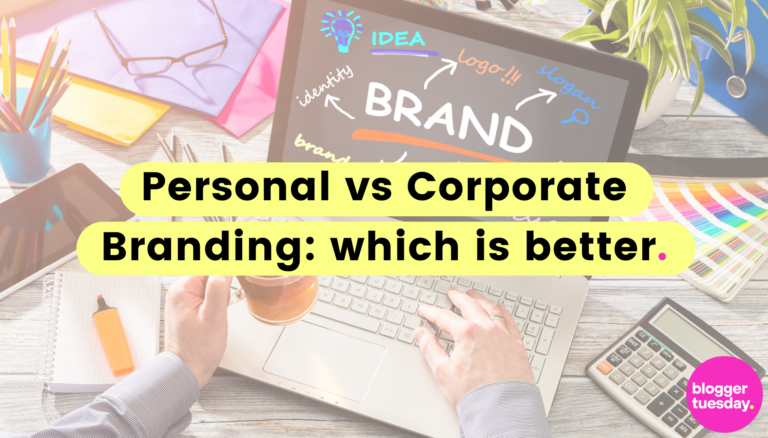Crafting a brand for your blog that speaks to your audience is crucial when you’re trying to build a reputation. But there’s one big question you have to answer before you can create a brand that works for you and your blog. Should you create a personal brand, based on you as a person and blogger, or should you choose a corporate brand that positions you as more of a business entity? This is an important distinction to make and a decision that you need to think about carefully. Both can have their advantages, and both can have some downsides too. So how can you decide which one is right for you?
First of all, keep in mind that there is no right way for everyone. In fact, both personal and corporate branding could be good choices for you. The most important thing is to choose the option that you’re comfortable with and that aligns with the goals of your blog. There are a few different things you might want to think about to help you make the best choice.
Image from Pexels – CC0 License
What Is a Personal Brand?
A personal brand is just what it sounds like. Your brand is based entirely on you as a blogger, and whatever topic (or topics) you choose to write about. You might name the blog after yourself, feature a personal bio prominently, and mostly write in the first person. You can find personal blogs across a range of niches. They can be about business, marketing, or the topic of blogging itself, or they could be lifestyle blogs about parenting, personal finance, and much more.
What Is a Corporate Brand?
Corporate branding is more about positioning your blog as a business. That’s not to say that a personal blog can’t be run as a business too, but corporate branding makes it a little less personal. It allows you to distance yourself from the brand a little and choose a professional name for a growing business. If your personal brand is “Jane Smith Photographer”, your corporate brand might be “Flash Photography School”.
Let’s look at some of the pros and cons of personal versus corporate branding for your blog to give you some clues on what might work for you.
Clarity
When people land on your blog, you want them to know what you’re all about. One thing to consider when you’re choosing between personal and corporate branding is which one makes it most clear what your blog is about. It can sometimes be easier to choose a corporate branding style that immediately lets readers know what your blog is for. When you use personal branding, it might take them a little longer to work it out. On the other hand, the difference could be a matter of a few seconds, especially as there are plenty of different ways to signal what your blog is and does.
Flexibility
The flexibility of your blog’s purpose is something you might want to think about when you’re choosing your branding. Let’s say you start off writing about baking, but over time you begin posting (or want to post) more about cycling or home decor. If you chose to use a corporate brand focused on baking, that doesn’t really give you the flexibility to start posting on other topics unless you make some big changes. A personal brand can give you much more flexibility to change what you write about as your interests change and as you identify what content does well.
If you have a lot of different interests that you want to write about, or you know your interests are going to evolve over time, a personal blog could be the best choice for you. However, if you know you want to stick to one topic, and perhaps share your expertise, a corporate-style brand could be preferable.
Business Growth
You know that you want to grow your blog and treat it like a business so that you can earn an income from it. But is a personal brand or corporate brand the better option for business growth? There’s no clear answer to this, but there are definitely some things you’ll want to think about before you decide.
One thing to consider is whether you want to use your blog to sell yourself and your skills in some way. For example, maybe you’re a photographer, a digital marketer, a coach, a speaker, or something else that involves building a personal brand. If this sounds like you, sticking with a personal brand can make a lot of sense. You are your business, and your business is you. People will visit your blog and see your personal brand and its strong connection to the services or products you offer.
However, it’s also important to consider that using a personal brand might limit how much you can scale your business. People will expect that they can have a personal connection with you, and you can only do so much. By using a business brand, you could have the opportunity to scale your business more easily. What’s more, it can even help you out if you want to sell your business later. It’s unlikely anyone will buy a business that’s based entirely on you as a person but could be possible with a corporate brand.
Outsourcing Content
Part of growing your blog and business might be outsourcing blog posts and other content. If you think you might want to do this, a corporate brand is often best. Why? Because it’s easier to have multiple authors or content creators on a blog that isn’t so personally attached to you. If your blog is named after you, people will expect you to be the one doing the writing. That’s not to say that you can’t have other people write for your blog if you have a personal brand. However, you might not be able to do it very often and will likely need to, at least, have your posts ghost-written so they appear to be written by you.
When you use a corporate brand, it can help to reduce the pressure of running your blog. You can rely on others to help you out and take a step back if you need to. By outsourcing, you can save time while still maintaining your brand.
Image from Pexels – CC0 License
Brand Connection
Forming a connection between your brand and your audience can be crucial, but what that connection looks like depends on your business. Obviously, personal branding can create a more personal connection. People will see you first and see the human in your brand. Of course, many corporate brands try to emulate that humanity. You can use a personable brand tone of voice to connect with your audience, for example. But it’s difficult for corporate brands to form such a personal connection when compared to personal brands.
A personal brand can make it easier to build trust and help people get to know you. It can be simpler for people to connect with a person’s interests, knowledge, and values than it is for them to understand a corporate brand’s mission and brand values. People can learn to trust and connect with corporate brands, but it often takes a lot longer.
Corporate brands can still have a strong connection to the person behind them. There are sites where the people who started them are featured prominently and are a big part of them, even if they don’t use their own names as branding. You can still build a community around your brand and keep the connection between you and your brand. For example, at Smart Passive Income, Pat Flynn has evolved a personal blog into a wider community and resource. Pat is still very involved in the brand, including releasing podcasts, and is the face of the brand without necessarily being the brand itself.
Combining Personal and Corporate Brands
When you’re choosing between personal and corporate branding, you should consider the possibility of doing both. In fact, you’re likely to do at least a little bit of this anyway. Even if you have a corporate brand, you’re probably going to develop a personal brand that you can use for networking and growing your professional profile.
Using both personal and corporate brands can work out particularly well for someone who has multiple businesses or websites. You can have a central personal brand, which you use to promote your other business brands. Your personal brand is the person behind your other brands. You can use it to display your expertise and become a voice of authority. You might have a blog or website that you use to promote yourself and secure speaking opportunities or other work. This site can also be used to bring your different properties together and promote them to your audience(s).
Both corporate and personal branding can work out well for your blog or website. Before you decide which is right for you, you should ask yourself some key questions about your goals, the image that you want to create, and how you want to connect with your audience.


